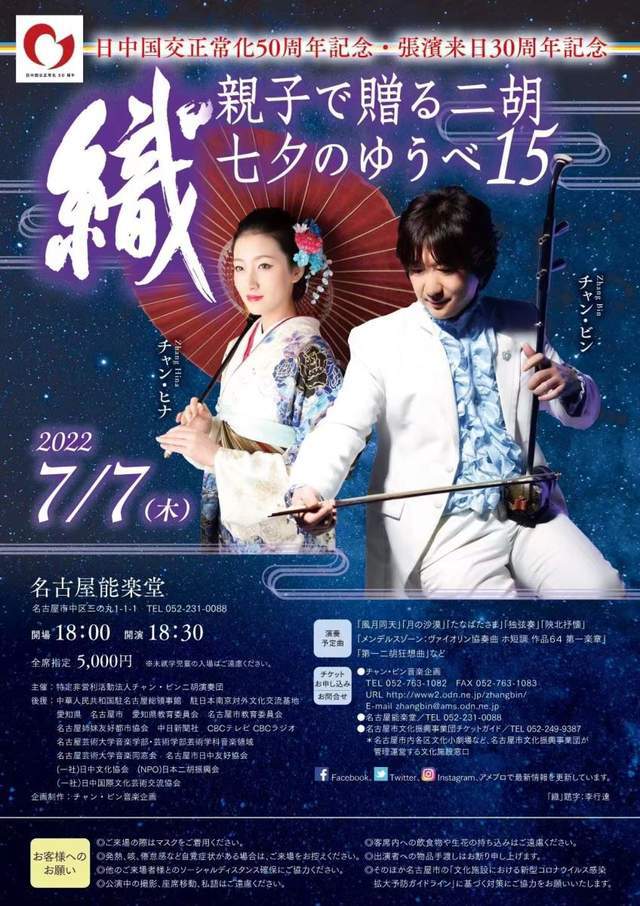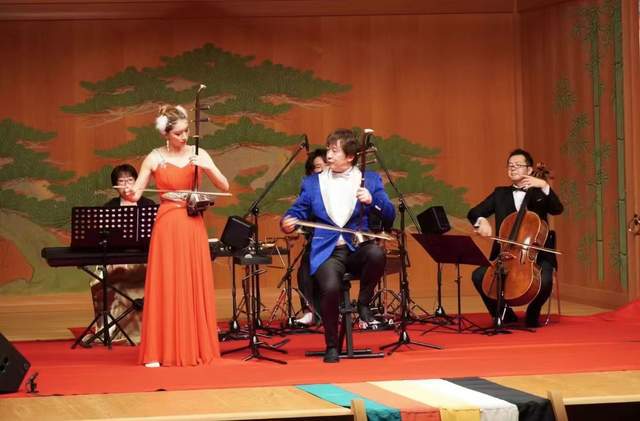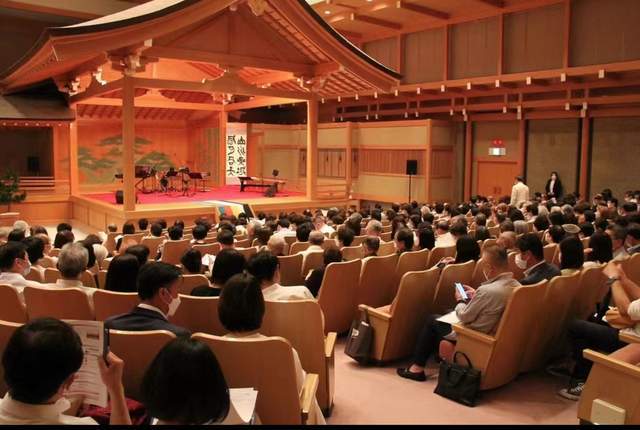On the 50th anniversary of the normalization of diplomatic relations between China and Japan, the Tanabata Father-Daughter Erhu Concert was held at the Noh Theater in Nagoya
Qixi Festival is an important festival in China and East Asian Chinese cultural circles. Although the date of Tanabata in Japan is somewhat different from that in China, the theme is the same, which is the eulogy of the beloved and the yearning for a better life. For overseas Chinese living abroad, Qixi Festival is a love for the hometown of China, and a deep yearning for their relatives across the oceans and seas.

Fifteen years ago, Zhang Bin, a famous erhu performer, and his daughter Zhang Rini, with their nostalgia for the motherland, their deep affection for the art of erhu, and their firm belief in revitalizing Chinese folk music overseas, held a festival in Nagoya Noh Theater, a traditional cultural sacred place in Japan. The "Qi Xi Father and Daughter Erhu Concert" has been held for 15 consecutive years. After the ups and downs of the Sino-Japanese relationship, and the ups and downs of the world, it has never been interrupted. In the sacred traditional culture hall of Japan, playing traditional Chinese folk music with the traditional Chinese national instrument erhu has special cultural connotation and significance. On the occasion of the 50th anniversary of the normalization of diplomatic relations between China and Japan, Zhang Bin and Zhang Rini used the unique and melodious sound of the erhu to build a magpie bridge spanning time and space between the people of China and Japan, echoing the two peoples' common wish for friendship between China and Japan from generation to generation. wishes.
Zhang Bin is a model of overseas music and art circles. With his brilliant artistic achievements and flashing personality, he has written a classic legend of Chinese-American artists overseas. Because of his efforts, the Japanese Ministry of Justice has rewritten the entry management policy and added an erhu artist visa program; Chinese folk music and erhu have been written into the textbooks of Japanese elementary schools, and some primary and secondary schools in the six central counties have added an experience to experience the traditional Chinese musical instrument erhu. The melodious sound of the Chinese erhu resounded on the international stage of Aichi Bombay; there was a scene of a hundred Japanese friends playing the erhu in unison at the Shanghai World Expo venue; erhu music became a feature of the cherry blossom season in central Japan; Japanese state-owned Local radio and television stations have added a special erhu music program; the Nagoya Festival has a Chinese-American artist waving on the cabriolet at the forefront of the procession in the city center.
Love in the world, God rewards hard work. The Chinese and Japanese governments and people fully affirmed Zhang Bin's outstanding contributions to China-Japan friendship, the revitalization of folk music, and the spread of Chinese culture. He is an overseas special member of the Nanjing Political Consultative Conference, an executive director of the Jiangsu Overseas Friendship Association, an executive director of the Nanjing Overseas Friendship Association, an overseas consultant and cultural ambassador of the Overseas Chinese Affairs Office of Nanjing, the Japanese representative of the Nanjing Foreign Cultural Exchange Center, and Nanjing Normal University. Guest Professor, Specially Invited Director of Erhu Society of Chinese Musicians Association, Honorary Director of Huqin Professional Committee of China National Orchestra Association, Special Ambassador for Nagoya Tourism and Cultural Exchange, Guest Professor of Nagoya University of Arts, Representative Director of Japan-China International Cultural Exchange Association, and public welfare activities The chairman of the legal person Zhang Bin Erhu Ensemble. In addition, the Aichi World Expo Organizing Committee, the Shanghai World Expo Organizing Committee, the Japanese Ministry of Foreign Affairs, and the Japan-China Cultural and Sports Exchange Year Executive Committee respectively commended Zhang Bin. China Central Television and Japan's national television NHK made special reports on Zhang Bin. The Asahi Shimbun (Aichi, Gifu, Triple Edition) and Japanese Chinese media published many articles, becoming the most popular Chinese in China and Japan. artist.

The blue is better than the blue, and the young phoenix is clearer than the old phoenix. Zhang Bin's daughter, Zhang Rini, has inherited her father's musical talent and hard-working genes, and has grown into a dazzling new star in the folk music world at home and abroad. Zhang Rini joined her father at the age of six and returned to China in the third grade of primary school. She was selected into Nanjing Xiaohonghua Art School, the only art primary school in China, and began her 16-year study abroad career. For a Chinese girl born in Japan, the difficulties encountered by language barriers, cultural differences and changes in living habits can be imagined. Talent, intelligence and diligence made her stand out. She was selected to enter the Central Conservatory of Music, where she studied under the famous erhu performer Sein Fei. After graduation, she studied in Singapore, the Department of Vocal Music of the Manhattan School of Music in the United States, and the Department of Opera Theory of Harvard University. She graduated with a doctorate degree in June this year.
All the way to travel, all the way to grow, all the way to glory. Zhang Rini did not live up to her efforts, nor did she live up to the expectations of her parents and the eager eyes of her followers. In 2009, she won the gold medal at the International Chinese Musical Instrument Competition. In 2012, she won the encouragement award of the rubbing stringed musical instrument youth group in the 4th National Youth National Musical Instrument Performance Competition hosted by the Ministry of Culture of China. In 2013, he won the youngest gold medal in the International Erhu Art Festival, the bronze medal in the second Dunhuang Cup National Erhu Grand Prix by the Erhu Society of the Chinese Musicians Association, and the silver medal in the Junior Professional Little Golden Bell Erhu Grand Prix organized by the Ministry of Culture of China. . She has appeared in China Central Television's music and variety shows for many times, and has also appeared in Aichi World Expo, Shanghai World Expo, Lincoln Center, Yale University, the Fifth International Finance Conference, Davos Annual Conference in Switzerland, Shanghai Concert Hall, and Sino-Japanese diplomatic relations are normal. The 35th anniversary concert in Tianjin and the 40th anniversary concert in Nanjing left behind performing figures. She also co-performed with the Japan Century Symphony Orchestra, and starred in the Chinese TV series "Our Adolescence" in 2017, becoming the leading role and the theme song, showing her versatile side and unlimited development space in the future.

This father-daughter Qixi Erhu concert showcases the different artistic styles and musical personalities of Zhang Bing and his daughter Zhang Rini, and reflects their explorations and pursuits at different latitudes and levels in the field of art. Teacher Zhang Bin pays attention to the deep cultivation of the erhu artistic tradition, and strives to reflect the historical thickness and breadth and depth of folk music. His skill without skill, without seeking the embodiment of the embodiment, makes the bow and string of the erhu, his own fingers and wrists perfectly integrated, reaching the pinnacle, which is indescribable. Daughter Zhang Rini's performance is full of passionate spirit of the times and youthful vigor.
Years of study abroad have brought elements of different cultures and expressions of modern art into her piano sound. The handling of melody and details reflects the unique feeling of the new generation of artists to music. The dexterity of technique and the diversity of expression have brought her playing style to a new dimension. The father deeply cultivates the artistic tradition, and the daughter expands the performance extension. The father and daughter jointly create a three-dimensional cultural space of erhu art.
This father-daughter Qixi Erhu concert moved people not only by the wonderful performances, but also by Zhang Rini's sharing of her study abroad life, the introduction of her growth process, and her bittersweet and sweet mental journey. In addition, Mr. Zhang Bing's gratitude to supporters, his prayer for Sino-Japanese friendship, and his love for erhu art were also touching. The friendly and enthusiastic Japanese audience also left a deep impression on everyone. Whether it was the long queue outside before the opening, or the continuous applause inside the venue, they expressed not only the love for Chinese folk music, but also the admiration for Zhang Bin's father-daughter personality and the expectation of friendship between Japan and China. . It is understood that many audiences have watched the first father-daughter Qixi Erhu concert for 15 consecutive years. This perseverance is as respectable and touching as the persistence.
Zhang Bin's efforts and dedication have been respected by the Japanese society. The Japan Culture Promotion Association presented Zhang Bing with the "International Art and Culture Award" at the father-daughter Tanabata Erhu concert, in recognition of Zhang Bing's outstanding contributions to the cultural cause of China and Japan.
 渝公网安备 50010702504639号
渝公网安备 50010702504639号